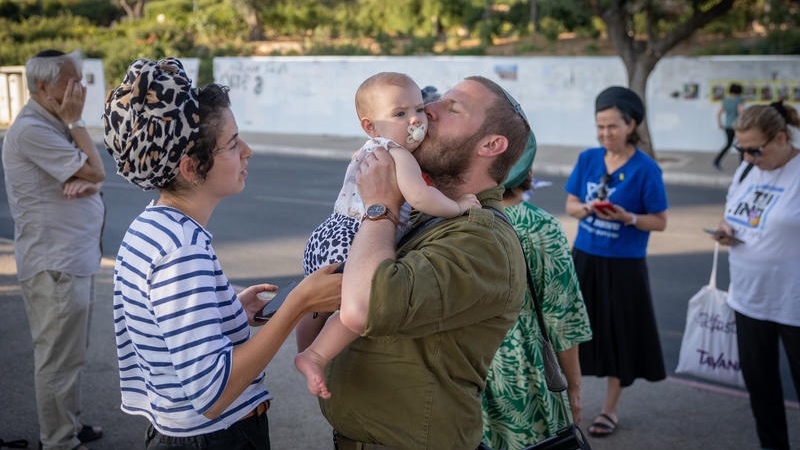Israel’s Central Bureau of Statistics released sobering data showing how nearly two years of near-continuous war has left a deep scar not only on the battlefield but inside Israeli homes.
The nationwide survey, conducted in April and May, examined the toll of extended reserve service on families of Israel Defense Forces personnel called up between Oct. 7, 2023, and Feb. 1, 2025. Its findings underscore a crisis of family stability and mental health.
Nearly half of all military marriages reported serious strain, with a third of affected spouses admitting they had considered separation or divorce. The longer the reserve duty, the deeper the damage: 36% of wives of men serving up to 50 days reported harm to their marriage, compared to a staggering 57% among those whose husbands served between 200 and 350 days.
Children, too, are suffering. More than half of families reported a decline in their children’s mental health, rising to 63% where fathers were away for more than 200 days. The report paints a picture of children weighed down by anxiety, instability, and the prolonged absence of a parent.
The burden extends to the spouses themselves. Six in ten wives said they required some form of outside help, with over half turning to psychological or emotional support, and nearly four in ten seeking financial assistance. Among wives of combat reservists, 68% sought professional psychological care—reflecting the intense stress tied to infantry and ground operations.
While informal support networks carried much of the weight—three-quarters of families relied on relatives or friends—the study noted sharp cultural differences. Religious families were the most likely to lean on family support (83%), compared to 74% of secular families and just 64% of the Orthodox.
Institutional support remains uneven. About 30% of families reported assistance from the IDF and 23% from local municipalities, with help more likely for those whose loved ones served over 250 days. Financially, most couples (87%) received compensation from the government, though divorced and single mothers were significantly disadvantaged.
The report comes as Israel marks nearly two years since the Oct. 7 Hamas massacres, in which 1,200 people were murdered and 252 kidnapped. Of the 48 hostages still held in Gaza, only about 20 are believed to be alive. Against this backdrop, the war’s hidden front—the toll on families left behind—continues to deepen.
The CBS findings confirm what many military families have quietly endured for months: the cost of Israel’s survival is being borne not just by soldiers on the battlefield, but by the resilience—and in many cases, the breakdown—of the homes they leave behind.
Want more news from Israel?
Click Here to sign up for our FREE daily email updates















“Come unto me, all you who labor and are heavy laden, and I will give you rest.
Take my yoke upon you, and learn of me; for I am meek and lowly in heart: and you shall find rest for your souls.
For my yoke is easy, and my burden is light.” Matt. 11:28, 29, 30.
I don’t see anything in the article referring to the best help waiting for His people to call upon His name, what does Israel have to lose by doing so? Throughout scripture, there are references to a stiff necked people, that doesn’t make the Lord love His people any less.
The Lord would love to hear from you, don’t you think it is time to give Him a try?